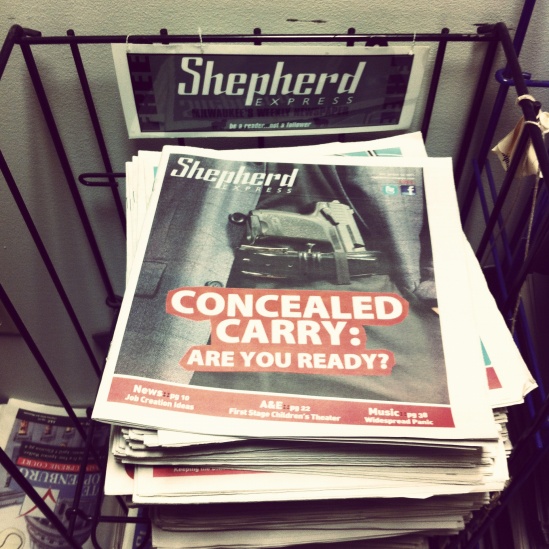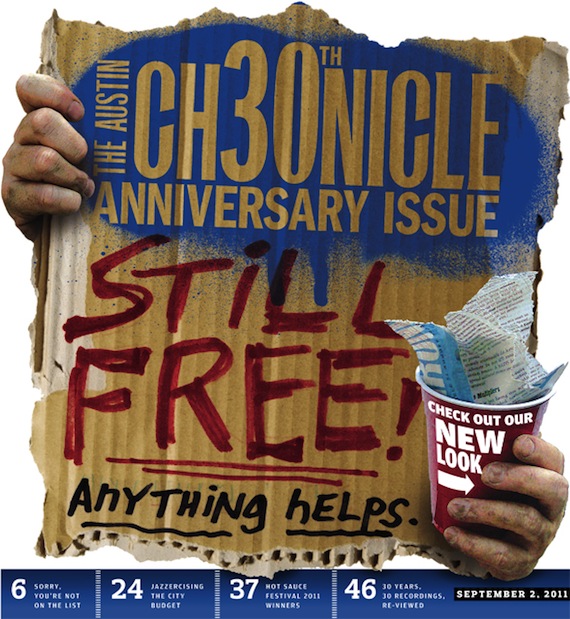Wisconsin Public Radio invited AAN executive director Tiffany Shackelford and Shepherd Express publisher Louis Fortis to talk about the state of alternative news media.
Over 1,000 readers contacted Roundy's Supermarkets after the company asked Shepherd Express to remove its newspapers from Pick 'n Save stores.
In honor of the occasion, the 30th anniversary issue of the Austin Chronicle on stands today will unveil a redesign of the paper.
Village Voice editor Tony Ortega has fired back at Austin Chronicle editor Louis Black's suggestion that some weekly publications lost their alt-cred when they were bought by publishing chains.
In a post-convention column about the state of the alt-weekly industry, Austin Chronicle editor Louis Black argues that many weekly papers have become "less alternative" since being purchased by larger media groups.
"It was basically four guys sitting around a room talking a lot. We would work on the Chronicle, take a break and talk more. We focused a lot on the big picture, but also the details," Black says about the time he and three friends founded the South by Southwest festival in the late 1980s. "We would sit there night after night and ask things like, 'OK, you land at the airport -- what happens next?'" Black has seen SXSW -- which happens next month in Austin -- grow from a music festival into a huge international event that also incorporates interactive and film festivals, and employs about 40 staffers. But despite the growth, Black says the festival remains true to its roots. "After all these years, SXSW is really still about creative people coming together face-to-face and collaborating," he says.
Joe Grafton, the executive director of Somerville Local First, interviews East Bay Express publisher Jody Colley and Austin Chronicle editor Louis Black for a piece in Boston's Weekly Dig about the local movement across the country. Colley talks about the campaign she organized last year that encouraged alt-weekly readers across the country to do their holiday shopping locally, and Black discusses the "symbiotic" relationship the Chronicle has with the local business community. Grafton has posted fuller interview clips of both of them on his Shift Across America blog.
The alt-weekly has revenue of approximately $8.5 million a year, has not laid off anyone and has no plans to do so, New York Times columnist David Carr reports. He says that part of why the paper has been successful is because of its ties to the community. "The Chronicle is knit into civic and cultural life in Austin to a degree that may make other newspapers nervous," Carr writes.
That seems to be the opinion of Ed Avis, who looks at the challenges alt-weekly owners are facing in a piece for Quill, a magazine published by the Society for Professional Journalists. Not surprisingly, he says the biggest challenge to the business is the internet. He talks to the Austin Chronicle's Louis Black, Creative Loafing's Ben Eason, and Times Shamrock's Don Farley to see where they are at in relation to the internet, and, more importantly, where they're trying to go. Ultimately, Avis thinks that the challenge of the online market -- in concert with the aging of the original alt-weekly founders -- is what's behind the industry's increased consolidation. Northwestern University professor and Academy for Alternative Journalism director Charles Whitaker agrees. "I think the (older owners) have had difficulty adjusting and figuring out the new media landscape, particularly the internet and things like Craigslist," he says. "At the same time, a group of new owners said, 'We can do this as a chain. We still have our alternative press sensibilities, but by pooling our resources we can run these papers more efficiently than they had been run in the past.'"
The first issue was a "disaster," says the Chronicle's co-founder, "a calamity so legendary that, for much of a decade, copies of it were not allowed in the office." The cover featured Shock Treatment, a movie destined never to open, and it was completely purple as the result of a miscommunication with the printer. The present-day Chronicle is "a paper as honest as we can get it," Black says. "We don't just create this paper, we're fans. We can't wait to see what's going to be in the next issue and the next and the next." In addition to Black's column in the Sept. 8 issue, the Chronicle posted a 25th anniversary photo album online.




